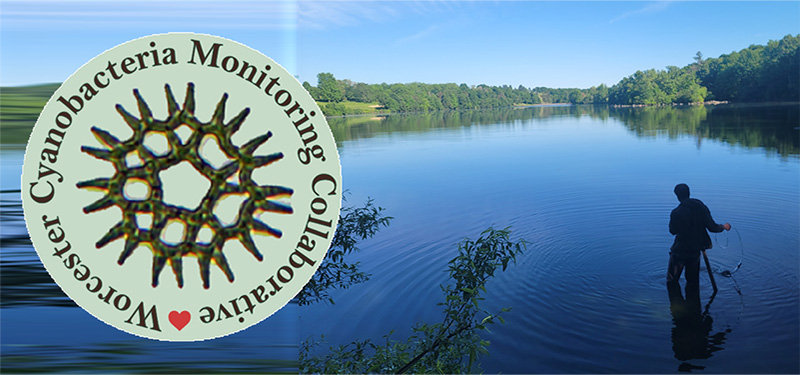
The Worcester Cyanobacteria Monitoring Collaborative (WCMC) is a group of volunteer community scientists that is working to better understand cyanobacteria in Worcester's lakes and ponds and the risk they pose to public health.
Latest Monitoring Results Volunteer Microscope Photos Volunteer Field Sheet Sampling Instructions
About Cyanobacteria
Cyanobacteria, also known as blue green algae, are naturally occurring microscopic organisms that use sunlight for energy. They are one of the oldest organisms on the planet, and found in almost every ecosystem in small numbers. However, under certain conditions, such as in warm, nutrient rich lakes, cyanobacteria can multiply very rapidly and cause "blooms". Blooms, in addition to potentially being unsightly and smelly, can cause low oxygen conditions in lakes when they die that can lead to fish kills. Additionally, when their population gets high enough, cyanobacteria are able to produce toxins that are harmful to humans and pets.
Depending on the species of cyanobacteria, these organisms have the potential to produce several different kinds of toxins, including hepatatoxins (affecting the liver), dermal toxins (affecting the skin), and/or neurotoxins (affecting the brain). Just because cyanobacteria are present, however, does not mean that toxins are being produced. Scientists are still learning the triggers for toxin production, but we do know that when there are higher concentrations of cyanobacteria, there is a greater chance that toxins will be present in harmful quantities. For that reason, it is important to avoid contact with water that have cyanobacteria advisories.
For more information on symptoms associated with cyanotoxin exposure, see Illness and Symptoms: Cyanobacteria in Fresh Water.
It can be hard to determine if a bloom is occurring without professional testing. The MA Department of Public Health advises that if a green surface scum is visible on a lake, a bloom can be assumed. However, not all scums are toxic and not all blooms have scums.
If you or your pet has been exposed to water that may contain cyanotoxins, rinse with tap water immediately. Do not let pets lick their fur. If your pet has ingested scums or water containing cyanobacteria, contact your veterinarian as soon as possible and refer to these CDC guidelines, Cyanobacterial Blooms: Information for Veterinarians.
What is the WCMC?
The Worcester Cyanobacteria Monitoring Collaborative (WCMC) is a group of volunteer community scientists that tracks cyanobacteria activity at our local lakes and ponds. Between May and October, volunteers collect samples 1-2 times a month and examine them under the microscope for cyanobacteria. In addition, the samples are analyzed using several other indicators of bloom risk. You can see the latest results by clicking the link at the top of this page.
Interested in Becoming a Volunteer?
If you are interested in becoming a volunteer, the Worcester Cyanobacteria Monitoring Collaborative is looking for interested individuals to help us study our lakes and ponds! You can contribute to a nationwide effort to understand how blue green algae is affecting our locally loved waterways. Volunteers will:
- Gain microscope and water quality sampling skills.
- Contribute to a nationwide study to understand cyanobacteria dynamics.
- Report water quality issues and learn how to prevent them.
- Meet other clean water advocates and water quality experts.
Volunteers do not need any scientific background to participate. If you are interested in becoming a volunteer, please contact greenworcester@worcesterma.gov.
WCMC Training Videos
A video series showcasing training for volunteers of the Worcester Cyanobacteria Monitoring Collaborative.
Watch Now!
Participating Waterways
Below are the waterbodies that are a part of the WCMC.
- Bell Pond
- Burncoat Pond
- Coes Reservoir
- Cooks Pond
- East Waushacum Pond (Sterling)
- Elm Park (Lincoln) Pond
- Farm Pond (Sherborn)
- Flint Pond (Shrewsbury)
- Green Hill Park Pond
- Indian Lake
- Jordan Pond (Shrewsbury)
- Lake Lashaway (N/E Brookfield)
- Lake Quinsigamond
- Leesville Pond
- Little Indian Lake
- Lower Ecotarium Pond
- Manchaug Pond (Sutton)
- Newton Pond (Shrewsbury)
- Patch Pond
- Patch Reservoir
- Salisbury Pond
- Stevens Pond (Sutton)
WCMC Data Presentations
Learn what over 50 volunteer community scientists found at Worcester Lakes in 2022!
On January 20, 2021 the WCMC had its first public presentation on the data they collected in the previous year. Watch the video here to see the water quality results from 22 local ponds and the lessons we learned.
Historic Reports
Reports of each sampling event can be found below. If you are interested in participating, please email greenworcester@worcesterma.gov.
Additional Resources
Check out the WCMC's poster presentation at the 2020 State of the Lakes:
Blue Space Minute Videos on Cyanobacteria:
- Blue Space Minute with Jacquelyn Burmeister - Indian Lake: A Resource Under Threat, Ep. 1
- Blue Space Minute - Indian Lake: A Resource Under Threat, Ep 2. Cyanobacteria
Learn more about what the city is doing to prevent cyanobacteria blooms.
Contact Information
Address
Sustainability and Resilience
51 Sever Street Worcester, MA 01609
Mailing Address: 455 Main Street
Worcester, MA 01608
Contact
Phone: 508-799-8324
Email Us
![]()
Hours
By Appointment
Monday - Friday
8:30 a.m. - 5 p.m.

